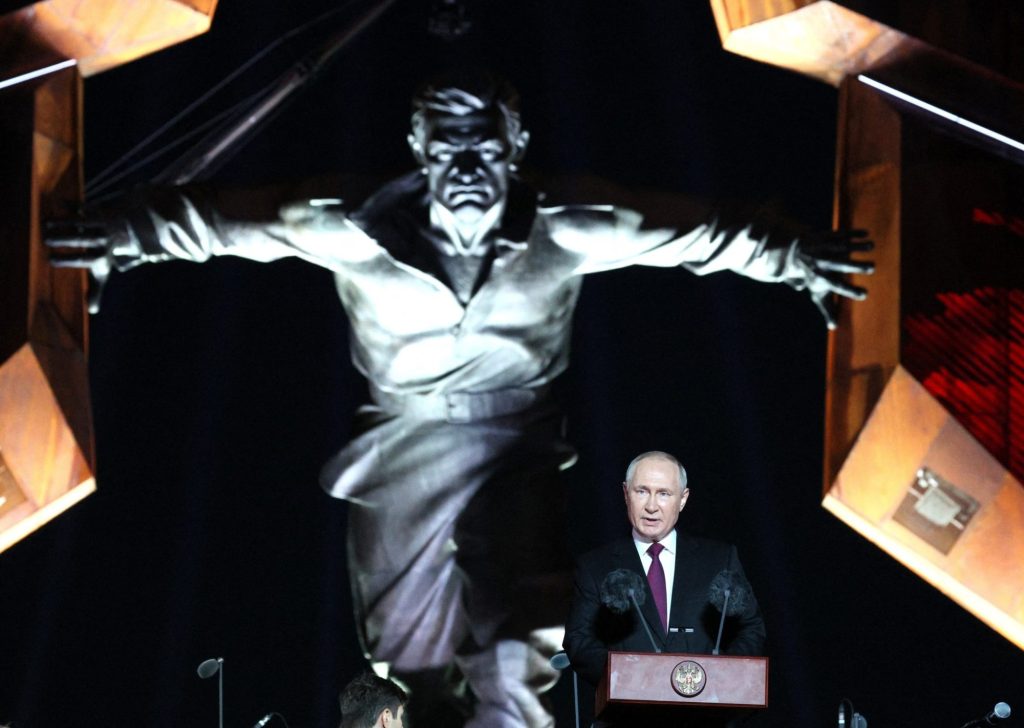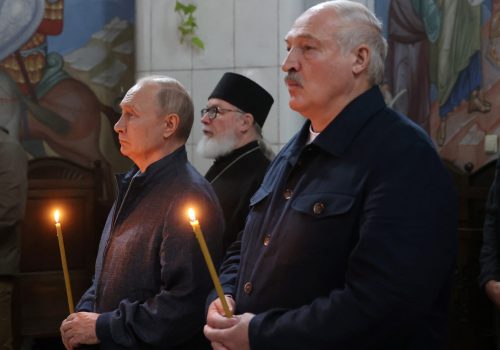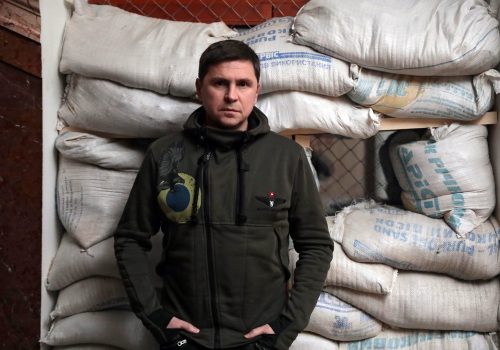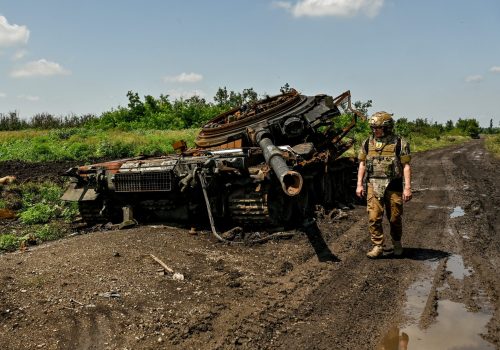The first line of the Ukrainian national anthem is perhaps best translated as “Ukraine’s glory has not yet perished.” Written in the middle of the nineteenth century at a time when the Russian imperial authorities were attempting to suppress all expressions of Ukrainian national identity, the anthem remains highly relevant and perfectly captures the determination of today’s Ukrainians as they resist a new Russian attempt to subjugate their country.
Ukraine’s sense of national identity has only strengthened since the onset of Russia’s current full-scale invasion. This was demonstrated recently when the Ukrainian government replaced the Soviet crest featured on the shield of Kyiv’s Motherland statue with the Ukrainian trident. Similar efforts to remove the symbols of Soviet and Russian imperialism are underway across the country.
The strengthening of Ukraine’s national identity and the consolidation of Ukrainian independence since 1991 is regarded by Vladimir Putin and many within the Russian establishment as an existential threat to Russia itself. Rather than acknowledge the existence of an independent and sovereign Ukraine, Putin remains in denial, and continues to insist that Ukrainians are really Russians (“one people”). Nor is Putin alone; many Russian leaders routinely question the legitimacy of Ukrainian statehood. Former Russian President Dmitry Medvedev is a particularly prominent Ukraine denier, proclaiming recently that the Ukrainian nation was established “by accident in the twentieth century.”
This refusal to recognize Ukraine as an independent nation is a longstanding Russian tradition stretching back hundreds of years. From the eighteenth century onward, successive Russian rulers have viewed any expression of a separate Ukrainian identity as direct challenge to Russia’s imperial identity and a potential catalyst for the breakup of the Russian state. In the modern era, independent Ukraine’s gradual embrace of European democratic values has added an ideological dimension to this Russian opposition, with Kremlin leaders fearful that Ukrainian democracy could prove contagious and spell doom for their own authoritarian regime.
Stay updated
As the world watches the Russian invasion of Ukraine unfold, UkraineAlert delivers the best Atlantic Council expert insight and analysis on Ukraine twice a week directly to your inbox.
Ukraine’s first push for statehood came in the seventeenth century, when Ukrainian cossacks rose up in an ultimately failed attempt to establish a state of their own. The modern independence movement gained ground throughout the nineteenth and early twentieth centuries, leading to the declaration of Ukrainian independence in 1918 during the chaotic aftermath of the Russian Revolution. The Ukrainian People’s Republic proved to be short-lived, but in many ways it paved the way for the independent state that would emerge from the wreckage of the Soviet Union in 1991.
Russia’s denial of Ukrainian identity and refusal to accept the reality of Ukrainian independence are now fueling an invasion that many view as genocidal in nature. According to the UN, a crucial indicator of genocide is the “denial of the existence of protected groups or of recognition of elements of their identity.” A very large number of public statements by Russian officials including Putin would seem to meet this definition. Russia’s efforts to destroy Ukraine’s cultural heritage, along with the relentless barrage of genocidal anti-Ukrainian rhetoric in Russia’s heavily censored and carefully choreographed mainstream media, strongly indicate genocidal intent.
In areas of Ukraine under Russian control, local populations are being subjected to a range of genocidal policies including summary executions and mass deportations, along with the abduction and anti-Ukrainian indoctrination of children. Those who remain are being forced to accept Russian citizenship. Meanwhile, all symbols of Ukrainian national identity are being systematically removed. An international investigation into alleged war crimes committed by Russian forces during the occupation of Kherson found that “Putin’s plan to extinguish Ukrainian identity includes a range of crimes evocative of genocide.”
Eurasia Center events

So far, Putin’s invasion is failing to achieve its imperial objectives. Indeed, the war he unleashed in February 2022 appears to have greatly consolidated Ukrainian national identity and confirmed the finality of the country’s historic departure from the Russian sphere of influence. Last year, as Ukrainians marked Independence Day for the first time since the start of Russia’s full-scale invasion, President Zelenskyy stressed the impact of the war on Ukrainian national identity, commenting that Ukraine had been “not born but reborn.”
Evidence of this rebirth can be seen in villages, towns, and cities across Ukraine. Millions of people who initially fled the Russian invasion have since returned home. Many are choosing to switch to the Ukrainian language in their everyday lives, while interest in Ukrainian history and culture has risen to unprecedented highs. Despite the horrors of the ongoing invasion, national pride is soaring, while polls consistently indicate overwhelming opposition to any kind of compromise peace that would cede Ukrainian land to Russia.
Ukrainian historian Serhii Plokhy, the Mykhailo Hrushevsky professor of Ukrainian history at Harvard University, echoes President Zelenskyy’s comments on the profound impact of the Russian invasion on Ukrainian identity. “What you see today in Ukraine is really something that many other nations experienced. It is a war for independence. And the war for independence is very much about the formation of this new identity,” he commented during an interview with NPR.
In February 2022, Vladimir Putin set out to extinguish Ukrainian statehood and erase Ukrainian identity. In doing so, he was pursuing a genocidal agenda that has deep roots in Russian imperial history. However, the Russian invasion has backfired disastrously for the Kremlin, greatly strengthening Ukrainian national identity while poisoning bilateral ties and shattering historic links that had once bound the two countries closely together. Russians may still be in denial over Ukrainian identity, but sooner or later they will have to face up to the reality of living next door to a strong and independent Ukraine.
Mercedes Sapuppo is a program assistant at the Atlantic Council’s Eurasia Center.
Further reading
The views expressed in UkraineAlert are solely those of the authors and do not necessarily reflect the views of the Atlantic Council, its staff, or its supporters.

The Eurasia Center’s mission is to enhance transatlantic cooperation in promoting stability, democratic values and prosperity in Eurasia, from Eastern Europe and Turkey in the West to the Caucasus, Russia and Central Asia in the East.
Follow us on social media
and support our work
Image: Russian President Vladimir Putin delivers a speech during a ceremony marking the 80th anniversary of the victory in the Battle of Kursk during World War Two in the Kursk region, Russia, August 23, 2023. (Sputnik/Gavriil Grigorov/Kremlin via REUTERS)




